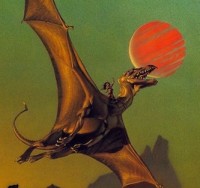When is a legend legend? Why is a myth a myth?

Weyr Search
by Anne McCaffrey
After my recent introduction to Anne McCaffrey’s work, I was pleased to find this novella, an opportunity to check out the Dragonriders of Pern fantasy series that McCaffrey was best known for. Oh dear. Maybe I’m not a fantasy person?
My hackles were up from the start, as the story is introduced with a lengthy, complex prologue setting up the world of Pern, its people and its politics. Frankly, I forgot most of it almost immediately, but skimming through it again, very little of it was directly pertinent to this story and it could easily have been dropped.
The story itself opens with Lessa, who is using magic to hide in plain sight in her home, Ruath Hold, after her family, the hereditary rulers of Ruatha, were all butchered by Fax, a warmongerer from a neighbouring hold and new ruler of Ruatha. Lessa is exacting a slow revenge by preventing Ruatha from producing any profit, but as the story opens she feels a portent that danger is coming her way.
“When is a legend legend? Why is a myth a myth? How old and disused must a fact be for it to be relegated to the category: Fairy tale? And why do certain facts remain incontrovertible, while others lose their validity to assume a shabby, unstable character?”
If this had been purely Lessa’s story, I think I might have quite liked it. She’s fearless and determined, but shortsighted about how her ruination of Ruatha is affecting its people. However, this is all rushed through far too quickly as backdrop to the central story – the dragonmen have arrived at Fax’s Hold in “Search”. Their leader, F’lar, is hunting for a woman for a purpose that is only slowly spelled out, and as he and his men travel the area it becomes clear how bad a ruler Fax is. He fears dragons and holds the dragonmen in low regard – it’s never quite clear if this is in ignorance of their power or because of it.
Perhaps if I was already familiar with the setting (and McCaffrey wrote many books and stories set in Pern) then I wouldn’t have felt so bombarded with exposition, but as it was I was constantly trying to get to grips with the terminology – Weyr, between, bronze rider, Impression, Dragonqueen, etc etc – at the expense of getting absorbed into the story.
“Lessa woke, cold. Cold with more than the chill of the everlastingly clammy stone walls. Cold with the prescience of a danger greater than when, ten full Turns ago, she had run, whimpering, to hide in the watch-wher’s odorous lair.”
My guess is that this story was written to specifically illustrate the process of finding a new Weyrwoman, and to an extent details are held back so that the reader is as in the dark as Lessa. I would also hazard a guess that this wasn’t the best introduction to the world of Pern, and fans would recommend a different starting point. However, I’m not sure it’s for me either way. It felt to me that information-overload is an essential part of McCaffrey’s fantasy writing style. Simple conversations are peppered with authorial comment on the political and social connotations of word choice or tone of voice.
But that’s not my only objection. Though I believe from a little research that this is not typical of McCaffrey, in this particular book the gender stereotypes bothered me. For a book that starts and ends with a powerful woman who has a purpose not related to romance, the bulk of the story is about men talking war and politics while all the women are either servants or wives/mistresses with little or nothing to say. To a certain extent you could argue that this illustrates the kind of man that Fax is, the result of his methods of leadership, but if this isn’t typical in Pern then not enough is said or done to make that clear to the reader. I certainly came away with my idea of “swords and dragons” fantasy being rooted in medieval politics and gender roles thoroughly backed up.
“Mnementh’s many faceted eyes, on a level with F’lar’s head, fastened with disconcerting interest on the approaching party. The dragons could never understand why they generated such abject fear in common folk. At only one point in his life span would a dragon attack a human and that could be excused on the grounds of simple ignorance. F’lar could not explain to the dragon the politics behind the necessity of inspiring awe in the holders, lord and craftsmen alike. He could only observe that the fear and apprehension showing in the faces of the advancing squad which troubled Mnementh was oddly pleasing to him, F’lar.”
I’d still like to read more of McCaffrey’s SF but I’m not convinced I want to try more of her fantasy. Unless anyone can persuade me I’m being unfair and/or direct me toward a better starting point?
First published 1967 in Analog.
Source: Republished in Lightspeed Magazine, issue 20, which I have a selection of back issues of thanks to the Kickstarter project Women Destroy Science Fiction!